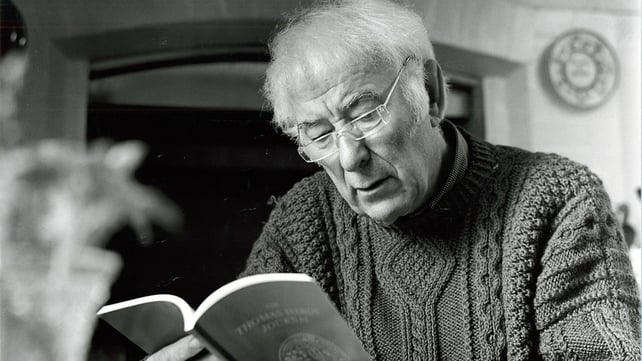I don't know whether it was the shadow of Seamus Heaney looming over me, or due to biting off more than I could possibly chew, but I have never had so much difficulty distilling my thoughts for Thought for the Day, into this single thought... If you didn't hear it live and would like to "Listen again", you will find it at 25minutes and 85 minutes in to Good Morning Ulster for Monday 2nd September on BBC Radio Ulster's iPlayer.
Like many I was saddened on Friday to hear of the death of Seamus Heaney, that most humane, humble and humorous of poets… I was waiting to pick up my son from school, the school I used to attend… the school where, in the midst of the troubles, I first read Heaney’s poetry … a school where, because of the mixed religious backgrounds of the pupils, we practised the art of evasion famously identified by him as a characteristic of our conflict… “whatever you say, say nothing…”
The church has been repeatedly accused of doing that in this province… Yet there were plenty who condemned violence from pulpits… Plenty who appealed for peace… But such pronouncements can be cheap if done from a distance… and even finely crafted words, be they those of a poet, a preacher, or an orator like Obama can seem empty without action…
On Friday the American Secretary of State John Kerry said that something must be done about the situation in Syria… Something perhaps, but what? A military strike against the Assad regime?… A tomahawk missile may be expensive, but the real cost of their use is borne by those killed and injured in collateral damage, or in the escalation of violence that may take place as a result.
The vote in Westminster on Thursday means that the UK will not be part of any military action, but will we do anything else to effect change other than using words to condemn abuses?
John’s Gospel describes Jesus as the Word of God… that life-giving word that brings order out of chaos… But it also says the word became flesh and lived among us… Jesus was born as a vulnerable child whose life was nearly taken by a brutal dictator; he lived as a humble carpenter and teacher who told tales of God’s Kingdom of grace, using, like Heaney, carefully chosen words and the experience of everyday local life; and ultimately his flesh was flogged and pierced, when he was unjustly executed as a rebel against the empire…
Words, as Heaney, demonstrated, can be powerful… But we who claim to be people of the word, followers of Jesus, need to remember that our words should find flesh and blood expression… That conflict must ultimately be addressed up close, through costly service. And that we are called bear the cost…
Whether it be with regard to Syria or Northern Ireland, we need to avoid using words to ultimately say nothing, or doing anything just to be seen to do something. Instead let us in everything seek to say and do the right thing…
The church has been repeatedly accused of doing that in this province… Yet there were plenty who condemned violence from pulpits… Plenty who appealed for peace… But such pronouncements can be cheap if done from a distance… and even finely crafted words, be they those of a poet, a preacher, or an orator like Obama can seem empty without action…
On Friday the American Secretary of State John Kerry said that something must be done about the situation in Syria… Something perhaps, but what? A military strike against the Assad regime?… A tomahawk missile may be expensive, but the real cost of their use is borne by those killed and injured in collateral damage, or in the escalation of violence that may take place as a result.
The vote in Westminster on Thursday means that the UK will not be part of any military action, but will we do anything else to effect change other than using words to condemn abuses?
John’s Gospel describes Jesus as the Word of God… that life-giving word that brings order out of chaos… But it also says the word became flesh and lived among us… Jesus was born as a vulnerable child whose life was nearly taken by a brutal dictator; he lived as a humble carpenter and teacher who told tales of God’s Kingdom of grace, using, like Heaney, carefully chosen words and the experience of everyday local life; and ultimately his flesh was flogged and pierced, when he was unjustly executed as a rebel against the empire…
Words, as Heaney, demonstrated, can be powerful… But we who claim to be people of the word, followers of Jesus, need to remember that our words should find flesh and blood expression… That conflict must ultimately be addressed up close, through costly service. And that we are called bear the cost…
Whether it be with regard to Syria or Northern Ireland, we need to avoid using words to ultimately say nothing, or doing anything just to be seen to do something. Instead let us in everything seek to say and do the right thing…

Comments